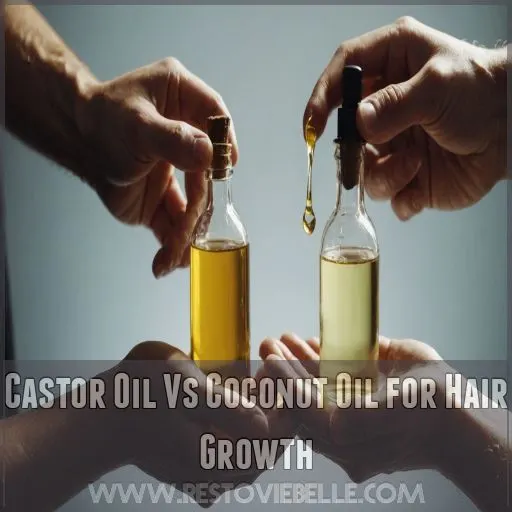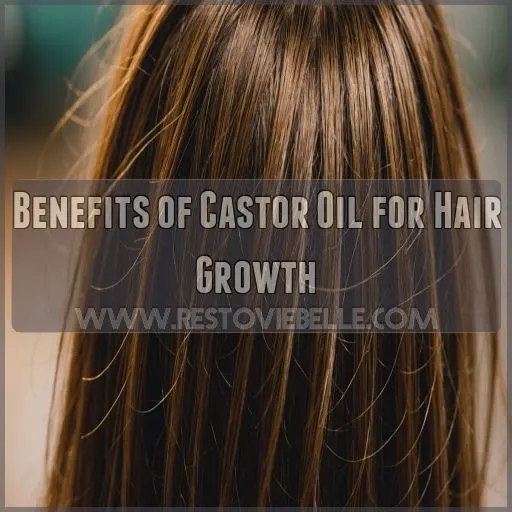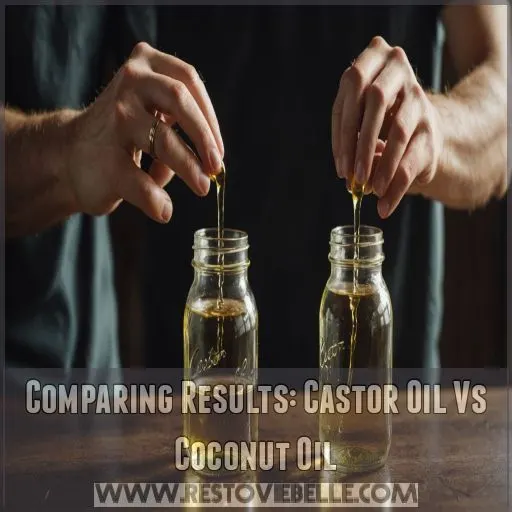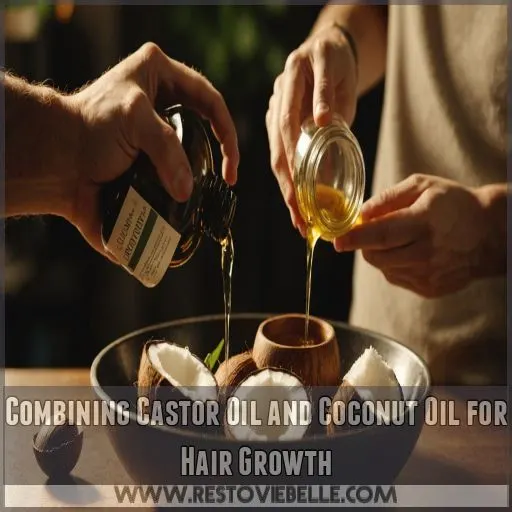This site is supported by our readers. We may earn a commission, at no cost to you, if you purchase through links.
 You’re in luck! Both castor oil and coconut oil can work wonders for your hair, but they’ve got different superpowers. Castor oil, with its ricinoleic acid, is like a growth cheerleader for your follicles. It’s thicker and packs a punch for stimulating those roots. Coconut oil, on the other hand, is the moisture master. It seeps right into your hair shaft, protecting it from damage and keeping it silky smooth.
You’re in luck! Both castor oil and coconut oil can work wonders for your hair, but they’ve got different superpowers. Castor oil, with its ricinoleic acid, is like a growth cheerleader for your follicles. It’s thicker and packs a punch for stimulating those roots. Coconut oil, on the other hand, is the moisture master. It seeps right into your hair shaft, protecting it from damage and keeping it silky smooth.
So which is better? It’s like choosing between chocolate and vanilla – they’re both delicious! The truth is, your hair might prefer one over the other, or even a dynamic duo of both. Stick around, and we’ll spill the tea on how to use these liquid gold treatments for luscious locks, like argan oil for hair.
Table Of Contents
- Key Takeaways
- Castor Oil Vs Coconut Oil for Hair Growth
- Benefits of Castor Oil for Hair Growth
- Benefits of Coconut Oil for Hair Growth
- How to Use Castor Oil for Hair Growth
- How to Use Coconut Oil for Hair Growth
- Comparing Results: Castor Oil Vs Coconut Oil
- Combining Castor Oil and Coconut Oil for Hair Growth
- Frequently Asked Questions (FAQs)
- Is coconut or castor oil better for hair growth?
- What oil is best for hair growth?
- Will my hair grow faster with castor oil?
- How often should I put coconut oil and castor oil in my hair?
- How long does it take to see results?
- Can these oils cause hair loss?
- Are there any side effects to consider?
- Do these oils work for all hair types?
- How often should I apply these oils?
- Conclusion
Key Takeaways
- Both oils can be your hair’s best friends, but they have different superpowers. Castor oil is like a cheerleader for growth, while coconut oil is more of a moisture magician. You don’t have to choose just one – why not invite both to your hair care party?
- Castor oil’s secret weapon is ricinoleic acid, which can boost blood flow to your scalp and potentially kickstart those lazy follicles. It’s like giving your scalp a wake-up call. Just don’t go overboard – a little goes a long way.
- Coconut oil is the king of moisture retention. It sneaks into your hair shaft like a ninja, protecting your strands from protein loss and damage. Think of it as a tiny umbrella for each hair, shielding it from the elements.
- For best results, you’ll want to be consistent and patient. Mix up your routine by using these oils separately or combine them for a power duo. Remember, your hair’s journey is a marathon, not a sprint – so sit back, relax, and let these natural oils work their magic over time.
Castor Oil Vs Coconut Oil for Hair Growth
You’ve probably heard about using castor oil or coconut oil for hair growth, but which one really works better to learn more about castor oil??
Let’s uncover the truth about these popular natural remedies and see how they stack up against each other for promoting healthy, luscious locks.
Chemical Composition of Castor Oil
Diving into castor oil’s composition, you’ll find it’s packed with ricinoleic acid, a powerful fatty acid that’s the star of the show.
This unique compound gives castor oil its anti-inflammatory and antimicrobial properties, making it a potential game-changer for your hair growth journey.
Chemical Composition of Coconut Oil
At the heart of coconut oil’s power lies its unique chemical makeup.
You’ll find it packed with medium-chain fatty acids, primarily lauric acid.
This structure gives coconut oil its ability to penetrate hair shafts deeply, offering a treasure trove of nourishing benefits for your locks.
Hair Growth-promoting Properties of Castor Oil
You’ve heard about coconut oil, but let’s talk about castor oil’s hair-growing magic. This thick, sticky oil isn’t just for grandma’s remedies anymore. It’s packed with properties that can give your locks a serious boost.
Here’s why castor oil might be your hair’s new best friend:
- Promotes blood circulation to the scalp
- Nourishes hair follicles with omega-6 fatty acids
- Balances scalp pH, reducing dandruff
- Strengthens hair shaft, preventing breakage
Hair Growth-promoting Properties of Coconut Oil
Coconut oil’s hair growth-promoting properties are truly impressive, like its ability to repair damaged hair. Let’s take a closer look at the top five ways this tropical treasure can transform your tresses:
| Benefit | How It Works | Tips |
|---|---|---|
| Moisture | Penetrates hair shaft | Apply to damp hair |
| Protein protection | Prevents protein loss | Use as pre-shampoo treatment |
| Scalp health | Antimicrobial properties | Massage into scalp |
| Breakage prevention | Strengthens hair fibers | Leave-in overnight |
| Volume boost | Nourishes follicles | Focus on roots |
Coconut oil is a versatile product that can be used in many ways to improve the health and appearance of your hair.
Scientific Evidence Supporting Each Oil’s Efficacy
The evidence is in, and it’s time to separate fact from fiction.
While coconut oil’s hair benefits are backed by solid research, castor oil’s reputation for promoting growth rests largely on anecdotal evidence. You can learn more about vitamin E’s benefits for hair.
Let’s take a closer look at what the science really says about these popular oils.
Benefits of Castor Oil for Hair Growth
You’ve heard the buzz about castor oil for hair growth, but is it really worth the hype?
Let’s uncover the surprising benefits of this thick, sticky oil and see if it’s the secret weapon your locks have been waiting for.
Ricinoleic Acid Benefits
Ricinoleic acid, the star player in castor oil, is your hair’s secret weapon.
This powerhouse compound packs a punch with its:
- Anti-inflammatory properties
- Moisturizing abilities
- Antimicrobial action
- Circulation-boosting effects
- Potential to balance scalp pH
It’s like having a personal trainer for your hair follicles!
While coconut oil has its perks, ricinoleic acid is the real winner for promoting hair growth. Don’t be surprised if your locks start doing a happy dance!
Scalp Health Improvement
| Benefit | Castor Oil Action |
|---|---|
| Dandruff prevention | Moisturizes dry, flaky scalp |
| Hair follicle health | Nourishes with essential nutrients |
| Hair loss prevention | Stimulates blood flow to follicles |
| Scalp dryness | Forms protective barrier |
| Hair infestation | Natural antifungal properties |
Castor oil can help with a variety of scalp issues.
Dandruff prevention is one benefit of castor oil.
Ready to give your scalp some TLC? Castor oil’s got your back!
Breakage Prevention Properties
You’ve heard about castor oil’s scalp benefits, but did you know it’s also a hair breakage superhero? It’s like a force field for your strands, keeping them strong and resilient.
Here’s how castor oil prevents breakage:
- Coats hair shaft, shielding from damage
- Improves elasticity, reducing snapping
- Seals in moisture, preventing brittleness
- Strengthens hair follicles from the root
Say goodbye to those pesky split ends! With castor oil, your hair will be tougher than a bodybuilder’s biceps.
Benefits of Coconut Oil for Hair Growth
You’ve heard about castor oil, but what about coconut oil for hair growth?
Let’s uncover the surprising benefits of this tropical wonder and see how it stacks up against its thicker cousin in the quest for luscious locks.
Moisturizing Properties
Ever felt like your hair’s as dry as a desert? Coconut oil swoops in like a moisture superhero!
It’s packed with fatty acids that quench your thirsty strands, leaving them soft and supple.
Say goodbye to brittle locks and hello to hair that’s hydrated and happy.
Penetration Into Hair Shaft
Now that you know coconut oil’s moisturizing magic, let’s talk about its superpower: hair shaft penetration. This oil doesn’t just sit on your strands; it dives deep into your hair’s core.
Here’s why that’s a game-changer:
- Nourishes from within
- Strengthens hair structure
- Enhances overall hair health
Protection Against Protein Loss
With coconut oil, you’re not just growing hair—you’re protecting it too! Its medium-chain fatty acids act like a shield, preventing protein loss from your locks. Think of it as a bodyguard for your hair’s natural strength and structure. Pretty cool, right?
Antimicrobial Properties
You’re not just protecting your hair from protein loss – you’re also fighting off unwanted guests! Coconut oil’s antimicrobial properties are like a bouncer for your scalp, keeping bacteria and fungi at bay.
It’s nature’s way of ensuring your hair grows in a clean, healthy environment.
Scalp Health Improvement
Beyond fighting microbes, coconut oil’s a superhero for your scalp.
It’s like a spa day for your head!
Massaging it in boosts circulation, nourishes those hard-working follicles, and helps keep flakes at bay.
Your scalp’ll be thanking you in no time.
How to Use Castor Oil for Hair Growth
Ready to learn how to use castor oil for hair growth?
Let’s explore how this thick, nutrient-rich oil can potentially transform your locks, from application methods to mixing tricks that’ll have you saying "hello" to healthier hair in no time.
Application Methods
Ready to explore castor oil for hair growth?
Let’s look at some application methods that’ll have your locks thanking you.
From scalp massages to pre-wash treatments, we’ll cover the best ways to harness this thick, mighty oil’s power for your mane.
Frequency of Use
Now that you’ve got your application method down, let’s talk timing.
How often should you use castor oil?
It’s not a daily affair.
Aim for a weekly routine to avoid oil overuse.
Finding your best frequency is key – too much oil can backfire!
Dilution Techniques
While regular use is key, let’s talk about taming that thick castor oil.
You’ll want to dilute it to avoid a sticky situation.
Mix it with carrier oils like jojoba or almond.
Start with a 1:1 ratio and adjust as needed for your hair type.
Combining With Other Oils
You’ve got the hang of diluting castor oil, but why stop there? Mix it with other hair-loving oils for a power-packed treatment.
Here’s a quick guide:
- Rosemary oil: Stimulates follicles
- Lavender oil: Soothes scalp
- Jojoba oil: Mimics natural sebum
It’s like creating a custom cocktail for your locks!
Potential Side Effects
Moving beyond mixing oils, let’s talk about the not-so-fun stuff. Castor oil isn’t all sunshine and rainbows. You might experience skin irritation, allergic reactions, or even hair breakage if you’re not careful.
Scalp dryness and oil buildup can also crash your hair growth party.
How to Use Coconut Oil for Hair Growth
Ready to transform your locks with the power of coconut oil? Let’s explore two effective methods for using this tropical wonder to boost hair growth: pre-shampoo treatments and overnight applications.
Pre-shampoo Treatments
Ready to supercharge your hair growth with coconut oil? Let’s talk pre-shampoo treatments! This simple yet effective method can work wonders for your locks.
Start by warming up a small amount of coconut oil in your hands. Gently massage it into your scalp and work it through your hair, focusing on the ends. Leave it on for 30 minutes to an hour before washing.
This DIY mask allows the oil to penetrate deeply, nourishing your hair from root to tip. For best results, wrap your hair in a warm towel to boost absorption.
Overnight Treatments
Ever dreamed of waking up with luscious locks? Overnight treatments with coconut oil might just be your ticket to hair growth heaven.
Before hitting the sack, warm up a small amount of coconut oil between your palms. Gently massage it into your scalp and work it through to the ends of your hair.
For an extra boost, wrap your hair in a silk scarf or use a satin pillowcase to prevent friction. This overnight hair routine allows the oil to deeply penetrate your strands, nourishing them as you snooze.
Come morning, you’ll be one step closer to that enviable mane. Just remember, consistency is key in your hair care journey!
Comparing Results: Castor Oil Vs Coconut Oil
You’ve tried both castor oil and coconut oil, but which one really delivers the best results for hair growth?
Let’s compare these popular oils head-to-head and see what the evidence says about their effectiveness for boosting hair thickness, length, and overall quality.
Rate of Hair Growth
You’ve learned how to use coconut oil for hair growth, but how does it compare to castor oil?
In terms of hair growth rate, both oils have their fans.
Your hair growth cycles, genetics, diet, and stress levels all play a role.
Scalp massage with either oil might give your locks a boost.
Hair Thickness and Volume
If you’re looking for ways to boost your hair’s thickness and volume, both castor oil and coconut oil are great options.
Castor oil’s ricinoleic acid may stimulate hair follicles, potentially leading to thicker strands.
On the flip side, coconut oil’s lauric acid penetrates the hair shaft, reducing protein loss and giving your locks a fuller appearance.
It’s like choosing between a protein shake and a deep conditioner for your hair!
Overall Hair Quality Enhancement
Both castor and coconut oils can work wonders for your overall hair quality.
They’re like a dynamic duo for your locks, each bringing unique benefits to the table.
When comparing their effects, you’ll notice:
- Silkier, more manageable tresses
- A noticeable reduction in frizz and flyaways
- A healthy, natural shine that turns heads
It’s like giving your hair a spa day, every day!
User Experiences and Testimonials
Countless users have shared their hair growth journeys online.
Let’s take a closer look at real-life experiences with castor and coconut oils.
You’ll find a treasure trove of insights in this table:
| Oil Type | Positive Feedback | Negative Feedback | Mixed Results |
|---|---|---|---|
| Castor Oil | Thicker hair | Greasy scalp | Slow progress |
| Coconut Oil | Softer texture | Allergic reactions | Minimal change |
| Mixed Oils | Balanced benefits | Time-consuming | Varied results |
These testimonials paint a vivid picture of what you might expect on your own hair growth adventure.
Combining Castor Oil and Coconut Oil for Hair Growth
You’ve heard about the benefits of castor oil and coconut oil for hair growth, but have you considered combining them for even more impressive results??
Let’s explore how these two powerhouse oils can work together to potentially supercharge your hair growth journey.
Synergistic Effects
You’ve seen how castor and coconut oils stack up individually, but what happens when you join forces? It’s like creating a superhero team for your hair! The synergistic effects of combining these oils can take your mane game to the next level. Here’s why this dynamic duo packs a punch:
- Oil blending enhances overall scalp health
- Combined anti-inflammatory properties soothe irritation
- Dual action improves hair texture and strength
Mixing Ratios
| Ratio (Castor:Coconut) | Benefits | Best For |
|---|---|---|
| 1:1 | Balanced nourishment | All hair types |
| 1:2 | Extra moisture | Dry or damaged hair |
| 2:1 | Growth boost | Thinning or slow-growing |
| 1:3 | Lightweight conditioning | Fine or oily hair |
| 3:1 | Intensive treatment | Very dry or coarse hair |
This table shows various ratios of castor oil to coconut oil, outlining their corresponding benefits and best applications for different hair types.
Application Techniques
Ready to give your hair a boost? Let’s explore some great ways to apply your castor and coconut oil mix.
Start with a warm oil treatment, gently massaging the blend into your scalp.
Try oil rinsing or a pre-wash application for extra nourishment.
Feeling adventurous? Rock an overnight mask for deep conditioning for intense hydration and repair. Your locks will thank you!
Potential Benefits and Drawbacks
Combining castor and coconut oils for hair growth can be a game-changer, but it’s not without its pitfalls.
While you might experience improved hair health and scalp nourishment, be wary of potential side effects.
Some folks report allergic reactions or clogged pores.
It’s like walking a tightrope – balance is key for reaping the benefits without compromising your locks.
Frequently Asked Questions (FAQs)
Is coconut or castor oil better for hair growth?
Like a garden, your hair craves nourishment. Castor oil‘s the fertilizer, promoting growth with its rich nutrients.
Coconut oil’s the gentle rain, moisturizing and preventing breakage.
For the best results, use both in your hair care routine.
What oil is best for hair growth?
You’re on the right track! Castor oil‘s your best bet for hair growth.
Its ricinoleic acid boosts circulation to your scalp, potentially stimulating those follicles.
Pair it with coconut oil for a double whammy of nourishment.
Will my hair grow faster with castor oil?
While castor oil’s thick consistency might make your hair feel fuller, scientific evidence for faster growth is limited.
It’s not a magic potion, but regular use could potentially improve scalp health, indirectly supporting hair growth.
How often should I put coconut oil and castor oil in my hair?
Apply the coconut and castor oil mixture to your hair once or twice a week.
You’ll want to let it work its magic for at least 30 minutes before rinsing.
Don’t overdo it, or you’ll end up with greasy locks!
How long does it take to see results?
Results can vary, but you’ll typically notice improvements in 2-3 months.
Remember, it’s not magic – consistency is key! Keep up your routine and be patient. Your hair’s journey is unique, so enjoy the process.
Can these oils cause hair loss?
Worried about hair loss? Don’t fret! Castor and coconut oils typically won’t cause shedding.
In fact, they’re often praised for promoting hair health.
However, you’ll want to watch out for allergic reactions or excessive use.
Moderation’s key!
Are there any side effects to consider?
You might experience scalp irritation or allergic reactions.
Watch out for itching, redness, or breakouts.
Don’t worry, though – these side effects are rare.
If you’ve got sensitive skin, start with a patch test first.
Do these oils work for all hair types?
Wondering if these oils are a one-size-fits-all solution?
While both castor and coconut oils can benefit various hair types, their effectiveness may differ.
Your hair’s porosity and texture play a key role in how well they’ll work for you.
How often should I apply these oils?
Apply these oils 1-2 times weekly for best results.
Don’t overdo it – your scalp needs to breathe!
Start with a light application, and adjust based on how your hair responds.
Remember, consistency is key!
Conclusion
Worried about choosing between castor oil or coconut oil for hair growth? Don’t fret! Both oils have unique benefits that can boost your hair health.
Castor oil’s ricinoleic acid stimulates growth, while coconut oil’s moisture-retaining properties protect and nourish.
The best choice depends on your hair’s specific needs. Why not try both? Experiment with each oil separately or combine them for a power-packed treatment.













